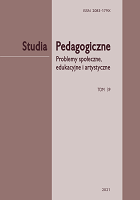Proces uspołeczniania adolescentów w okresie pandemii jako determinant skutecznej edukacji zdalnej – wyzwanie pokolenia iGen
The Process of Adolescents’ Socialisation in Time of the Pandemic as a Determinant for Successful Distance Education – iGen Generation Challenge
Author(s): Grzegorz Kiedrowicz, Katarzyna Ziębakowska-CecotSubject(s): Education, Health and medicine and law, Sociology of Education, Distance learning / e-learning
Published by: Wydawnictwo Uniwersytetu Jana Kochanowskiego
Keywords: socialisation; adolescence; pandemic; distance education; iGen ;
Summary/Abstract: The forms of distance education introduced on a massive scale during the coronavirus pandemic clearly showed that the priority should not only be the content of education, but meeting the basic needs of iGen generation students in accordance with the idea of “Maslow before Bloom”. One of the key needs among youth is socialization and creating conditions for its proper course. To determine the relationship between determinants of the adolescence process and the effectiveness of distance education, a survey was carried out in the first quarter of 2021 among over 200 high school students from Radom region. Although all surveyed students use social networking sites, which by definition should support the development of peer contacts, the vast majority, about 80% of teenagers, declared their preference for direct interaction in the real world. The need for contact with “living” people is so big that adolescents most often indicated it as the main challenge of distance education. Some students also noticed that minimal contacts with peers and teachers diminished usage of learning methods and means that support understanding and remembering the content and skills learned (e.g. lack of teamwork). Sudden, unforeseen learning conditions are a source of so much stress for nearly 2/3 of respondents that they assessed their well-being as bad (reporting mental problems, breakdowns). The research results provide an opportunity for many reflections, incl. educators to make teachers and students aware of the importance of “visible” learning, creating conditions for adolescence and learning at the same time.
Journal: Studia Pedagogiczne. Problemy Społeczne, Edukacyjne i Artystyczne
- Issue Year: 39/2021
- Issue No: 39
- Page Range: 79-97
- Page Count: 19
- Language: Polish

